Carl Abrahamsson's Blog, page 37
June 2, 2020
My Ezra Pound-James Laughlin lecture
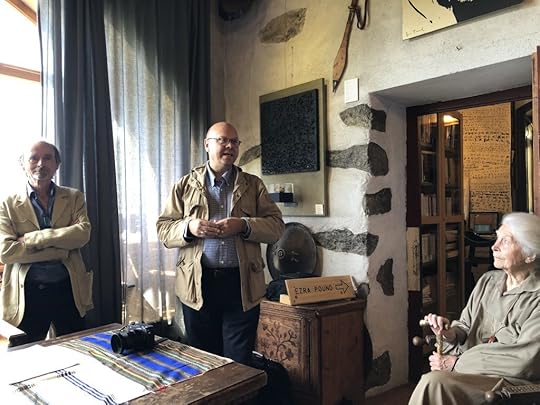
Exactly one year ago I gave a talk at Schloss Brunnenburg in Südtirol: “Literchoor, Kulchur and a Damned Fine Friendship: on the Symbiosis of Ezra Pound and James Laughlin,” right after a GREAT talk on Futurism and Techno-Spirituality by anthropologist Ethan Clarke. GOOD TIMES! Watch us right here:
The audio only version on Soundcloud can be found here:
May 27, 2020
My Magical Thing

I’m a guest in Julian Vayne’s excellent MY MAGICAL THING series, talking about pen talismania, Ezra Pound, Paul Bowles, and other things… Enjoy!
Freddie Wadling on YouTube

After a long and successful presence in the VOD sphere, I have now made my documentary “Ingenting är sant, allting är möjligt – En liten film om Freddie Wadling” available for free on YouTube:
Freddie Wadlings samtal med Carl Abrahamsson 1987 och tre klassiska Blue For Two-låtar inspelade 1987 blev till Super-8-filmen “Love begins to write a book” 1988. 26 år senare återskapade Abrahamsson och Wadling det hela, med samma frågor och samma låtar framförda av Blue For Two (Henryk Lipp & Freddie Wadling). Resultatet? En fascinerande tidsresa i ett konstnärskap och en evigt sprakande närvaro i svenskt kulturliv.
En film av Carl Abrahamsson, Sverige, 2015. 35 min.
May 15, 2020
My new documentary is released
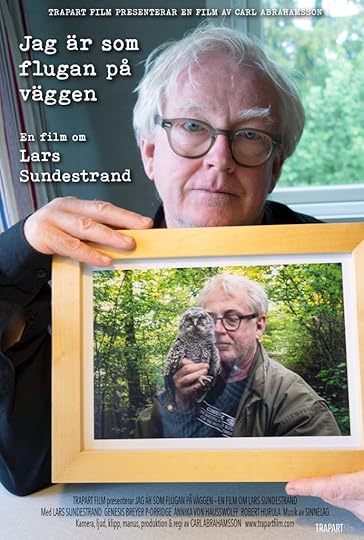
My new film is released today: JAG ÄR SOM FLUGAN PÅ VÄGGEN – EN FILM OM LARS SUNDESTRAND. And yes, it’s in Swedish!
Carl Abrahamsson, Sverige, 2020. 57 min. Medverkande: Lars Sundestrand, Genesis Breyer P-Orridge, Annika von Hausswolff och Robert Hurula.
Genom sitt fanzine FUNTIME (1978-1983) blev fotografen Lars Sundestrand synonym med den tidens punk- eller “gör det själv”-anda och estetik. FUNTIME blev snabbt Sveriges mest kända och inflytelserika fanzine. Efter denna explosivt kreativa period jobbade Lars Sundestrand vidare som fotograf för en mängd dagstidningar, och även som teaterfotograf på Göteborgs Stadsteater, GöteborgsOperan, Västanå Teater och många fler. Under färdens gång har han gjort över 80 fotoböcker, bland annat om/med Ebba Grön, Throbbing Gristle, Hurula – och hela nio böcker om och med Freddie Wadling! Endast ett fåtal av dem har distribuerats eller ens visats upp.
I filmen JAG ÄR SOM FLUGAN PÅ VÄGGEN berättar Lars Sundestrand själv om vad som driver honom att skapa nya bilder och bokprojekt. Vänner som Genesis Breyer P-Orridge, Annika von Hausswolff och Robert Hurula berättar också i filmen om samarbeten, inspirationer och om Lars Sundestrand som person.
May 14, 2020
Radio Mega Golem – Episode 3
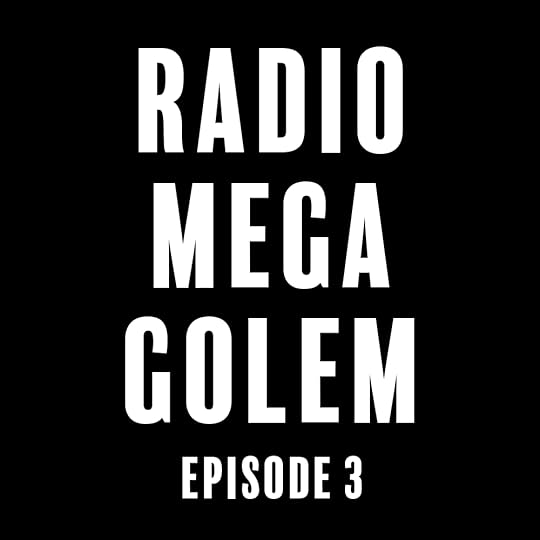
Welcome to Radio Mega Golem: a transmission for and from the Mega Golem – the artwork created by Carl Abrahamsson in 2009, and which has since been partially added to by a number of other artists.
EPISODE 3:
”A dear one’s passing is the actual mind of the Mega Golem.”
Invisible Guest of Radio Mega Golem this evening was Peter Beard, whose palimpsestic imprint on the fabric of consensus reality is now and forever irrevocable.
May 10, 2020
Into A Time And Space Of Wordship

Where to even begin? How to even express all of the emotions evoked by this one single yet highly complex being?
Well, why don’t we begin with the end? Genesis Breyer P-Orridge died on March 14th 2020. Although it was expected (having battled leukemia for several years), the actual moment you hear of the demise – that definitive, irreversible insight of mortality – is always downright horrible.
BAM! That’s it. It’s over. No more hugs, looks, conversations, dinners, drinks, spontaneous decisions, telepathic jokes or any of the millions of other facets that make human communication so endlessly fascinating. Gen was now gone; leaving behind a sense of very acute loss.
We were scheduled to host an evening together at the wonderful NYC bookstore Mast on March 19th, celebrating the release of Sacred Intent, a book that anthologizes all of our interview-conversations between 1986 and 2019. On March 11th, my wife and I decided to not go to the US (we live in Sweden) because of the increasing Corona virus panic. I wrote to Gen that we should postpone the evening so that there was no risk of him getting infected, and he agreed. On Thursday the 12th our decision was (re)enforced by the official ban on traveling to America. So, a done deal!
Then, on the morning of March 14th, Gen died.
On the very last page of our book (a conversation from November 2019), Gen asked what I thought a world without him would be like. Hesitantly, I answered:
”I’m trying not to think of it too much. But if I do, I’m just thinking of how blessed I’ve been. You know, we’ve worked together since 1986; we’ve never really had a disruption except for normal disruptions of time. It’s just been extremely valuable. We’ve made these three beautiful albums, and this book, and many other things, and it’s just a blessing. I don’t think I will have emotional problems with it. It’s just a matter of carrying on the work, like you did; you carried on the work. I will carry on the work, and then other people will carry on the work. It feels like a blessing to me.”
This is what psychoanalysts call rationalization. I very rationally moved a potentially threatening emotional cluster to a sphere of thinking. This does not work out so well in reality, however, and that is where I’m at as I write this.
This remarkable artist changed things, thinking, people, movements, art, memories, perceptions, culture in general, and so many other things; I cannot think of any other punch-packer of similar stature in the western world of art and esotericism.
Neil Andrew Megson was born in 1950 in northern England, and then morphed into the new identity of Genesis P-Orridge in the late 1960s. Communal and psychedelic experiments transformed themselves into a radical and ultra-creative view of performance art and ”industrial” music and what not, via C.O.U.M. Transmissions and Throbbing Gristle (TG); only to carry on in the magical and occultural network Thee Temple Ov Psychick Youth (TOPY) and the ever shapeshifting sounds and Gestalts of Psychic TV. Only to carry on with the much written about Pandrogeny project together with Gen’s wife, Jackie ”Lady Jaye” Breyer.
In the early 2000s, the couple morphed together into an artistic, alchemical ”pandrogyne” simply called Breyer P-Orridge. They created gender-dissolving art and philosophy in theory and practice, while a new constellation of Psychic TV (called PTV3) traveled the world as psychedelic renegades of love and colorful illumination.
Always writing, always talking and giving interviews about ideas and projects… The P-Orridgean eloquence gave birth to not only the ”industrial” culture of the mid 1970s (and onwards) but also to a new way of looking at occultism and its inevitable result: ”occulture” (a term Gen coined early on). These inherently essential areas of human culture were now suddenly no longer compartmentalized, arcane and dusty; garbed in pseudo-religious symbols and ensuing patriarchal power struggles.
As Throbbing Gristle changed the way music was perceived, so Psychic TV and TOPY changed the magical spectrum and catapulted it into a distinctly contemporary scenario in which individual liberation became a highly charged weapon against the draconian forces of ”control” (a concept inherited from Gen’s friend and mentor William S Burroughs).
Pandrogeny then did the same thing in and for the decidedly dysphorian identity culture of the 2010s. As new reactive positions were also on the verge of becoming too rigidly dualistic, then suddenly here came the magical Pandrogyne, saying that you don’t have to be either or – either male or female – and you also don’t have to change into the other ”either/or” either. There are always more options, and they’re never definite or eternal. Identity, as everything else, is completely malleable.
Working in music, writing, performances, collages, sculptures, and many other expressive forms, Gen amplified this malleability and unpredictability of given solutions, and even developed it into a solid artistic method:
”If you want to do something creative and new, you have to step away from what’s expected and destroy the expected; find what is around you that could make a sound, look at what people expect, and do the opposite.”
This is not mere head-on ”contrarianism,” but rather an application of the proven insight that there’s potentially real impact in constructive transgression, and especially if the time is right. Which it always seemed to be for Gen as the celebrated ”cultural engineer”… Throbbing Gristle weren’t just against the prog rock or heavy metal or pop music of the mid 70s; the project also distanced itself from the punk scene by leaving any kind of three chord proletarianism (or the romanticizing of it) far behind through weaving in real intellectual ideas and new sounds (including primitive ”proto-sampling” via cassette recorders).
This was then totally topsy-turvied with Psychic TV’s first album (”Force the Hand of Chance,” 1982) integrating lighter pop sounds and more ambitious orchestrations; sort of 180° from the harsh existentialist experimentalism that TG were known for. Amplified further in mid to late 1980s rock’n’roll PTV and, again, in PTV3’s psychedelic rock-cum-spaceship-music.
The cut-up technique, as developed by mentors William S Burroughs and Brion Gysin, was quintessential in both theory and practice. Not only in writing and collage work, but also in life in general. Cutting up the given, and trusting the ”random” process when reassembling the new parts, often reveal hidden aspects of meaning that can guide you onwards. This was more than mere intellectual dada wordplay; for Gen, the cut-up method was very literally a way of life.
2019 saw/heard the release of what was to be not only our joint final album, but also Gen’s: ”Loyalty Does Not End With Death” (Ideal Recordings). Beautiful spoken word recordings of poems, cut-ups and texts that I had set to ambient, electronic music; hopefully amplifying the potency and emotional reverberations inherent not only in the words themselves but also in the absolutely flawless delivery from Gen; in every way not only a poet par excellence but also a master vocal seducer.
It turned out we had made an album together every 14 years. In 1990 there was ”At Stockholm” (by Psychic TV & White Stains). In 2004 there was ”Wordship” (by Thee Majesty & Cotton Ferox). In 2018 (when we recorded the ”Loyalty” album) we had divested ourselves of monikers and project names, and it felt very good. Stripping away superfluous layers to reveal what was underneath the surface: a creative ”third mind” friendship, this time described simply as Genesis Breyer P-Orridge & Carl Abrahamsson.
In 2016, I made the documentary ”Change Itself” about Gen’s work. He was overjoyed that it deliberately transcended the musical projects and instead focussed mainly on the art and poetry:
”We thought art has to be about your life; your life has to be about art and the act of creation. Comprehension by others is the least important aspect. You do things that touch you and that feel symbolically powerful to you. You look for potency and the reclamation of your right to create and dream and reassess and adjust and rebuild consensus reality as you see fit. It is your absolute right.”
This altruistic-demagogic side of Gen’s permeated a lot of the output, regardless of media or form. In this sense, I think Gen genuinely carried on a torch from the 1960s that most others just let slip and slide and fade away as an entire generation left the psychedelic states of mind behind. It is never mere loose ”hippy” philosophy though; Gen’s multifaceted ideas and concepts were tried and tried again (in praxis as much as theoretically), and over the decades he wove in ideas from many different times and cultures. The red thread was always the ”sacred intent…” Even if you do things strictly for yourself, they should be altruistically anchored. And if you do beneficial things for others, you can rest assured it will be of gain for you as an individual, too.
The P-Orridgean philosophy is basically a holistic approach that could be shamanic, Buddhist, Santeria, Vodun, or stemming from western magicians like Aleister Crowley and Austin Osman Spare. Arguing that it was all essentially the same, Gen integrated ingredients of infinite intelligence, and cooked up a masterful and tasty dish for others as much as for himself.
Working with Gen back in the TOPY days (I was administrator of the Scandinavian ”branch” called TOPYSCAN and later on TOPY EUROPE between 1986 and 1991) was extremely exhilarating. There was this constant sense that we were breaking new ground. Probably because we were. There were no other magical orders like TOPY. There was no other network of free-flowing, radical information (often disseminated by xeroxes or cassette tapes of rare archival material) like TOPY, and certainly no internet to help out… There was no other ”movement” that encouraged its members to explore magic and individuation by actively making talismanic art – including a ritualized use of sex. There was no other similar think-tank that endeavored to apply wisdoms from the 1960s without falling into the traps of wishy-washy (re)sloganeering. At least not as far as I know.
And that was what brought me into the Gesamtkunstwerk that the sphere of Genesis P-Orridge actually was. My interest in magic and pop culture, and how they could potentially merge, led me to become a subscriber to TOPY’s newsletters, and it boosted me so powerfully in terms of inspiration I immediately wanted to become involved. Having watched the mind-bending and soulful video experiments of Psychic TV at an art college in Stockholm in 1984 made me realize that this unique mix of theory and practice was not only extremely creative and magical; it is also (still) of multi-purpose use and relevance for and in the future.
In 1986 I visited the TOPY headquarters in London for the first time. We had already been in touch via letters, but this first personal meeting was definitely life-changing for me. It was beyond mere Psychic TV fanboy-ism, as that first interview also touched upon quintessential, philosophical P-Orridgean concepts in the making:
”Some of the people are part of what we call ’Thee Sex Tribe.’ They follow us around and tend to do what they call ’sexual terrorism.’ They strip off and dance and do all kinds of things. The sexual tribe is growing considerably. What’s interesting is that the girls don’t act as heterosexual girls or lesbian girls. They just act in a sexual way. Boys who otherwise would never kiss a boy might kiss a boy and not feel embarrassed or inhibited at that moment. That’s the healthiest part of all. They feel free from any inhibitions at that period of time. There is a temporary, yet very strong, suspension of any Either/Or, male/female definitions. It’s a zone of new sexuality.”
There was already then also the ”staple” attitude that never changed for Gen, and which inspired me greatly in terms of self-discipline and productivity:
”I don’t think that just because I’m Genesis P-Orridge I have to do all the exciting work. I’m happy to sweep the floor and knock down a wall and make a cup of tea as well. Everyone should feel like that. There is no more important or less important job. There’s just, ’What has to get done? Who can do it? Let’s get it done as quickly as we can and let’s do more and more and more…’”
That constructive workaholism has helped shape my own life for the better, and I’m very grateful for that. Gen proved time and time again that one has to walk the talk: to have highfaluting, cosmic ideas is not enough; you have to reinforce your vision by hard work, and, yes, why not amplify it all by some ritual magic as well?
So I guess that was the beginning: November 1986. Leaving Gen’s house with a goodie bag of xeroxes, cassette tapes, pamphlets and magazines, and with life-altering impressions of this weird, soft-spoken little sorcerer with sad, tired eyes and a relentlessly rewarding work ethic.
It will take time and effort to process this huge loss, and I’m certainly not going to be alone in this. Together, we’ll sadly also have to wallow through disgruntled ghosts’ recollections of injustices here or abuses there; of angry moments here, and sad conflicts there. Yes, Genesis P-Orridge was human like all the rest of us, and a human life is always filled with downs as well as ups, and with people who will hate us when relationships are over. Nothing new there. But there is one aspect that brings solace, justice and protection to our memory in these bitter little rain showers that already sprinkle upon us: without Genesis P-Orridge it is highly unlikely that these tepid hang-arounds would have had any artistic careers at all.
As for those of us who do remain genuinely grateful to this enigmatic and generous humane being, all we can do is carry on the work. And, rest assured, we absolutely will.
Stockholm, March 23, 2020
(An unedited version of my text for the memorial issue of The Brooklyn Rail, published April 23, 2020)
May 4, 2020
23rd Mind TV – Episode 4

Episode 4 of the “23rd Mind TV” show is out there! Join Vanessa and myself as we process our past month’s creative output, and also talk about cool things people have sent us. Many thanks to our Patreon supporters who are making this extravagant media adventure possible!
Support the 23rd Mind TV project HERE!
May 3, 2020
Our Life Could Be At Least Doubled
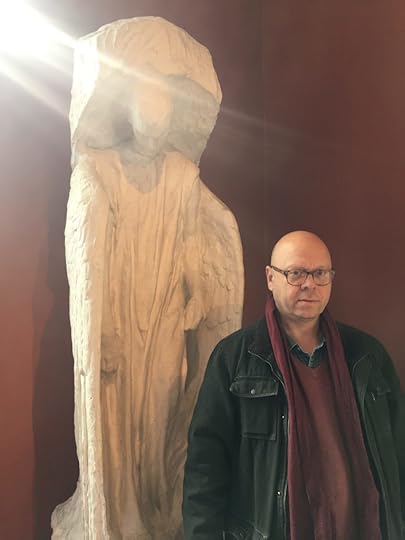
This is a little piece I wrote for the German magazine Wendepunk.t in 2018. I thought it might cheer you up:
Is our existence now actually at a turning point in history? Are we living in the very eye of an apocalyptic storm (or hurricane, even); inside the very core of a critical mass?
It is tempting to believe it, if we judge by the so called media flow – “real” and “fake” alike. Never before has there been such an avalanche of chaotic memes and schemes. However, this is mainly a technological phenomenon; not one of information proper. The messages, reactions, pros, cons, attempts at manipulation and coercion, etc, are basically the same as they were one hundred years ago. But the digital gadgets and gizmos facilitate an unprecedented and amplified onslaught that temporarily shuts down critical thinking and instead opens up the floodgates of clashing emotions, thinly disguised as “debate.” It’s a weight issue considerably more than a “Wait!” issue.
These platforms of encouraged shortsightedness are of course used by all sides, and in all political arenas. Those citizens who are anchored outside this onslaught in terms of time and background have an advantage in realising that what we’re experiencing is something out of the ordinary; they have experienced a time without these gadgets and platforms.
For those immersed in technology since birth or at least youth, it’s considerably more problematic, because what’s inside the technology is inherently regarded as “true.” The technology is both consciously and unconsciously part of a reality in which the truth is somehow embedded. If a critical thinking process or a historical perspective isn’t integrated early on in contemporary schooling, the children will be absolutely helpless in what could definitely be seen as a negative turning point in human culture. Those with an agenda to sell are overjoyed.
But what about the other side then? Critics of technology, myself included, are usually very quick to react emotionally too, and they often loudly remember some distant, golden age in which there was surely some other kind of (criticised) technology too, but not on a level this invasive.
Diametrical dualism pushed to the extreme in simplified messages and a parallel, gradual dismantling of judiciary systems and general ethics. Noise drowns out the signal but instead of fixing it, everyone just raises the volume even more.
“Thus it comes about that all armed prophets have conquered and all unarmed ones failed; for besides what has been already said, the character of peoples varies, and it is easy to persuade them of a thing, but difficult to keep them in that persuasion. And so it is necessary to order things so that when they no longer believe, they can be made to believe by force.” (Macchiavelli, “The Prince”)
Is contemporary reality just a Machiavellian wet dream made manifest by unenlightened cynics? Or are we witnessing, as some claim, a well needed challenge of static political behaviour, primarily contested via amazing new “tech”?
The answer to both questions is a resounding No! What we’re witnessing is merely a “critical mass-flirting” or petting, and an “eye of the storm voyeurism.” None of these phenomena will change anything – unfortunately.
The extremely compensatory behaviour in puerile political pendulums, technological worship, the fetishising of space travel, the immense wealth generated by home-shopping, an uncritical approach to “artificial intelligence,” etc, all leads to the very same conclusion. Which is: In actual fact, nothing is really happening on the overall human level except for a massive denial of guilt. On a higher level though – the bird’s eye view – we are witnessing first-hand how the tangibility of our own wreckage is creeping closer. And creeping closer to home very quickly. That can be quite painful to realise.
The reaction to this is (as we’re experiencing each day in the media flow) supremely compensatory. No really rational agendas beyond existing bureaucracies churning away on detail level. Cherishing artificial intelligence instead of our own, to create an optimally dystopian scenario (Don’t these people read science fiction?). Leaving climate change treatises in defiance while adhering to infantile religionisms and fairytale moralisms. Longing desperately for a safe place in space (where, of course, “no-one will hear you scream!”). Bickering and bitching, and letting lawyers sort out the endless aftermaths.
But still I argue that this is of no real concern to human existence. Our essential needs are profoundly basic, and we are profoundly adaptable when push comes to shove. We have more than enough of everything. It is however of great concern to something that has now taken over large chunks of the (mainly) Western mind frame: the human death wish. It’s a thing. It’s a thing in itself. The unconscious drive to destroy, kill, and most importantly, to be killed, is now so strong that it’s going to be quite hard to stop it. Perhaps even impossible?
And maybe that’s actually a good thing? That it all breaks down before all of the death-wish projections through technology and weaponry destroy too much for sensitive biospheres in general and for other species? A systemic change is obviously needed but I suspect that even such a phenomenon will be sublimated into a kind of “denial of denial.” Not to be escapistically arrogant but rather to inspire by courage in the same arena as the death-mongers. Using the same platforms and media to deny the death drive, deny the moronic media flow, deny unintelligence, deny compensatory simpletons. If enough people stick with their own individual visions, no-one will have a need for an imposed, attempted collective suicide.
The intelligent people will stay safe when the unintelligent crumble in their own rubble and dirt. Then, hopefully, we can get back to being constructive and creative human beings again, smiling and minding our own little businesses. Then the children (of all ages) can finally grow up, individuate, and enjoy life in peace. And create amazing things, as real humans do.
A healthy dose of egotistical survival instinct filtered through poetry and humour could very well be the best way forward. We should allow ourselves to be guided by Salvador Dali rather than by an army of un-individuated engineers and business people who simply wish to die and preferably take the rest of us with them. Let’s deny them that ambivalent pleasure. Let the rest of us get on with life. Amor Fati!
“Proust’s Remembrance of Things Past is not the hyper-individualistic lucubration of a blasé. It is the very healthy basis of a whole Dalinian system by virtue of which the physical span of our life could be at least doubled. For you could then tell yourself that what you are now living you could live again better, at the same time that you were living something different. I especially. Everything which I miss living at every instant, everything that I am wasting at present, all the ineffable, congealed cascades of sensation and emotion which escape me at this moment without my even being aware of it, this whole treasure of life, of time which I am losing, one day I shall find again, with a fresh wonder, in a new and real terrestrial paradise.” (Salvador Dali, “50 Secrets of Magic Craftsmanship”)
April 30, 2020
Pandemic Possibilities
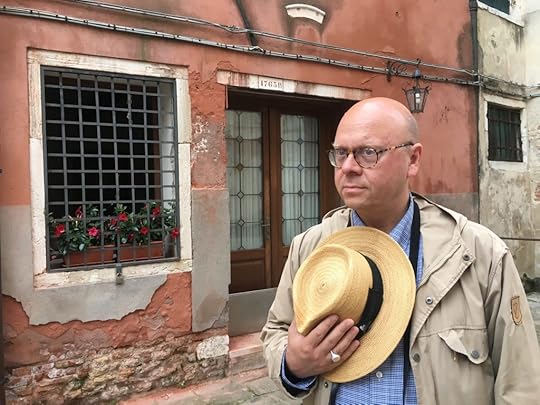
Let’s just begin by admitting that we’ve been very blessed. No wars, no natural disasters, no pandemics… Well, until now, that is. But that is exactly what brought up the blessing aspect in my mind. Up until now, it’s been a pretty smooth ride. Did we really think it was going to last forever?
An extension of this state of feeling blessed certainly touches upon the actual isolation most of us are experiencing right now. For me and my wife Vanessa, life is not that out of the ordinary. We both work from home anyway, and work continues more or less the same. I am happy/blessed to realise that business hasn’t fully slumped to the level I dreaded initially. I guess people still need books to read – perhaps now more than ever?
I don’t know whether it’s a new kind of rhythm because we hardly go out anymore, or whether we have a deep-rooted fear of the pandemic itself that simply makes us ultra-efficient. No matter what, we have been incredibly productive recently, and we have also cleaned the apartment more than ever before, and have even gotten around to going through discarded, earlier agenda lists to see what can be done… There’s always something to do!
Basically, despite the overall tragedy of the pandemic, it has certainly provided many blessings of this creative kind. I hope that the financial gain from these new manifestations or projects will compensate for the revenue decrease that has absolutely occurred – although it’s very much worse for others I know.
This is definitely a good time to be creative. It defeats depression, deflates delusions, and boosts your spirit (and thereby your health); and you can probably make some money while at it. So, why the hell not?
I’ve got a full plate of things to do, and I deal with these every day. They make me very happy. Here’s a list of things you could do, if you’re tired of Covid isolation and ensuing passive procrastinations:
Read a book. Read several books.
Find out what really makes you tick creatively if you don’t already know it. Then just do it. No lingering… Get right to it.
You very likely have a smartphone and some kind of computer. That means you also have access to a high quality camera, sound recorder and video camera, and free editing facilities that will definitely get you started. Make a podcast, a film, a piece of music. Share it online and see what happens. Or just make it to amuse and satisfy yourself.
If you need money, create a crowd-funder via established platforms like Kickstarter or IndieGoGo. Or a Patreon page for yourself and/or your project(s).
Record your impressions of your isolation/life right now in some kind of diary form (written, spoken/recorded or filmed). Share it with others – or not. No matter what, it will be valuable as history writing in the future; for yourself and possibly for others, too.
Reconnect with old friends and family members that have been on your mind recently.
Read a book. Read several books.
Go through all your digital photos on all those hard-drives, make selections of all your favourite ones, and then order prints, so that you can make old-fashioned photo albums. Another kind of selective history writing that is also a lot of fun.
Making music together is easy, as are other collaborations that can be manifested online. Make some music with your friends and distribute it via Bandcamp, Soundcloud or some similar place. Have fun, and create some far-out stuff!
Although it’s hard to resist, try avoiding becoming a slave to “streamed” TV and “binge-watching” attractive series. They will very likely only make you depressed and craving more. It’s in their inherently addictive structure/nature, but you deserve better.
If you need exercise, all you need is a little space and your own body. Nothing external is needed. Design your own minimalistic workout routine. Or, by all means, join some online group variant if that feels better. Needless to say, our bodies need to be strong and healthy in times like this.
Read a book. Read several books.
To keep up with all the things Vanessa and I are doing, please join us at: www.patreon.com/vanessa23carl
(The photograph of me in beloved Venice was taken by Vanessa.)
April 22, 2020
The Exquisite Corpse
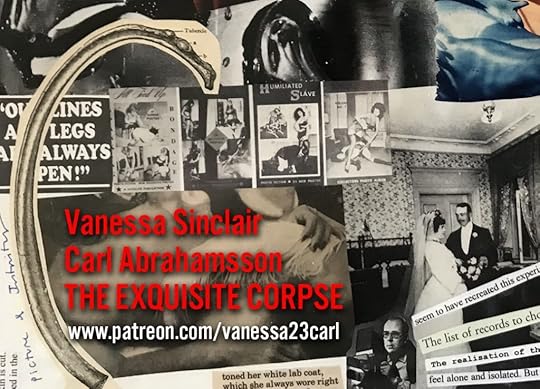
“All it takes is a reader to create a refinement of the spell. What I am compelled to write, I write. If someone is compelled – or perhaps just curiously attracted – to read whatever has been written, a process of refinement has begun.”
Chapter One of our novel “The Exquisite Corpse” is now available for the $10 and up patrons. A new chapter is posted every two weeks… Come join the fun!



